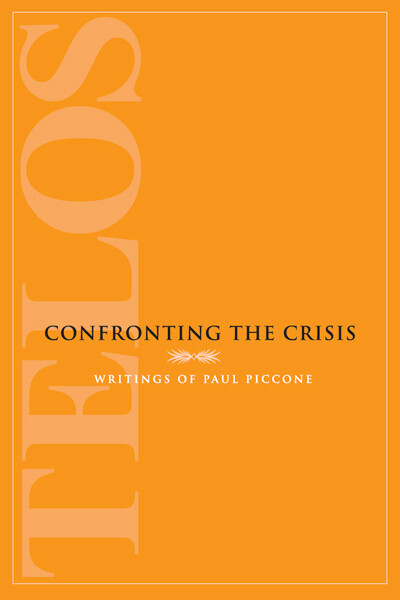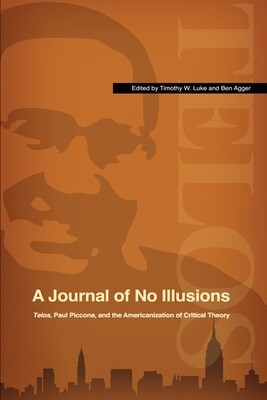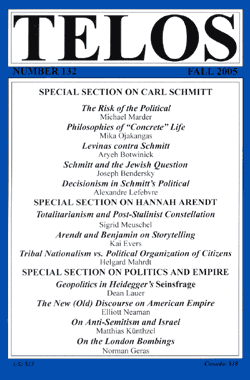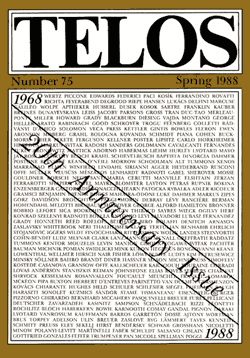Confronting the Crisis: Writings of Paul Piccone (hardcover)
Confronting the Crisis:
Writings of Paul Piccone
Edited and Introduced by Gary Ulmen
Confronting the Crisis gathers together for the first time the full range of Paul Piccone's best writings from Telos. This anthology traces a compelling intellectual journey, while providing important commentary on the major contemporary issues. It covers the progress of both Piccone's thinking and the journal's project, beginning with early investigations into phenomenology and Marxism, as well as pioneering studies of Critical Theory and "artificial negativity." It includes far-sighted analyses of new developments, such as the rise of the New Class and the decline of traditional divisions between Left and Right, and it leads eventually to a consideration of the political possibilities of federalism and a reinvigorated populism. The title of this collection refers to Edmund Husserl's last major work, The Crisis of European Sciences and Transcendental Phenomenology, from which the title of the journal, Telos, also originated. The loss of the subject of history, i.e., the philosophical-historical idea or teleological sense of European humanity, was the "crisis" that concerned Husserl, and that Piccone examined in all its ramifications. He confronted it with a unique passion and a rare intellect. The results make for absorbing reading.
News!
Confronting the Crisis was a Finalist in the Philosophy category of the National Best Books 2008 Awards, sponsored by USA Book News.
Praise for Confronting the Crisis
"This collection of essays by Paul Piccone documents a seismic shift in understanding philosophy and sociology after 1968. Often polemical, humorous, and hard-edged, these writings are a testament to a passionate intellect."
—Robert D'Amico, Professor of Philosophy, University of Florida
"As dynamic and imaginative a thinker as a teacher, Paul Piccone drew on legacies of European thought—phenomenology, the Frankfurt School, and the larger philosophical tradition—to articulate a powerful and critical theory. During the transition from modernism to postmodernism, from industrial capitalism to information societies and globalization, Piccone brought his vigorous intelligence to bear on the new social formations with insight and compassion. The range of his thinking, documented in this volume, demonstrates a consistent ability to identify new phenomena—the obsolescence of the bureaucratic state, the end of Marxism, the lability of nations, the resurgence of religion, and the ongoing vitality of lived traditions. Piccone's contributions were a breath of fresh air in an intellectual world too often dominated by orthodoxies of correctness and academies of caution."
—Russell A. Berman, Walter A. Haas Professor in the Humanities, Stanford University
"Reading the pages of Confronting the Crisis, one can hear the distinctive voice of Paul Piccone. That unique voice communicates the depth and scope of an acute intellect and an intense spirit grappling with the contradictions and chaos of contemporary global capitalism. Whether it is the limits of Western Marxism, the advent of a new geopolitics, the collapse of state socialism, the fragmentation of nation-states, the revitalization of traditional faith, the failure of research universities, or the trap of contrived multiculturalism, his writings rarely fail to be engaging, often prove enraging, and continue to be rewarding. Never professionally correct, always intellectually provocative, Piccone's critical theory says much about what must be done to fulfill the promise that Telos has sought to keep alive across the wide-open range of European philosophical criticism."
—Tim Luke, University Distinguished Professor, Department of Political Science, Virginia Polytechnic Institute and State University
"Paul Piccone not only founded and edited Telos, but he also emerged as one of America's most brilliant social critics with the upheavals of 1968 and the genesis of the New Left. At a time when young radicals made a fetish of oppositional action, he called for more serious theoretical reflection. A decade later, when engagement and activism gave way to conformist politics and support for bureaucratically steered social programs, Piccone posed populist and federalist alternatives in order to reignite radical opposition based on self-directed communities."
—Franklin Hugh Adler, De Witt Wallace Professor of Political Science, Macalester College
"Paul Piccone's reputation is bound to increase after his death, for while he was alive he was too busy thinking and acting to find time to establish it through self-promotion or even by collecting his writings into book form. But now that this service has been performed by his friends, it will be seen that he was far more than merely the founder and editor of a remarkable journal. For in his own right as a thinker, he saw that truly radical, critical reflection would have to break with the bounds of being 'left-wing' as normally understood. The current volume gives the reader the chance to see how Piccone's thought evolved from left political theory to his own specific Telos stance. And the consistency of this trajectory now appears clearly to view."
—Catherine Pickstock, Reader in Philosophy and Theology, Fellow and Tutor of Emmanuel College, Cambridge
"Paul Piccone was that rare bird: a truly independent intellectual, ferociously so. He courted controversy, and his years presiding over Telos reflected that. Piccone argued passionately, yet he treated his opponents, in private, courteously. That was a rare thing then, and it is even rarer now. Piccone never asked which 'team jersey' you were suited up in as a precondition for engagement. More power to him."
—Jean Bethke Elshtain, Laura Spelman Rockefeller Professor of Social and Political Ethics, The University of Chicago
"Paul Piccone belonged to a species virtually extinct: the independent theorist. He wrote without fear; nor did he seek favors. He strode through the thickets of critical theory with vigor and dispatch. His writings deserve to be remembered, read, and celebrated."
—Russell Jacoby, Department of History, UCLA
Hardcover · 396pp
ISBN-13: 978-0-914386-38-4
Pub. Date: June 1, 2008






